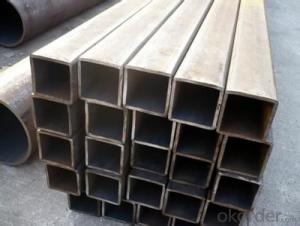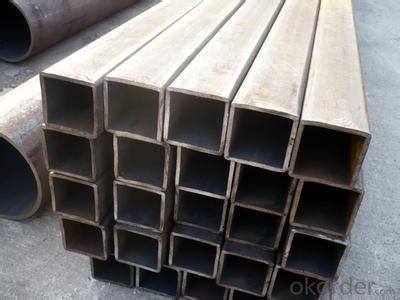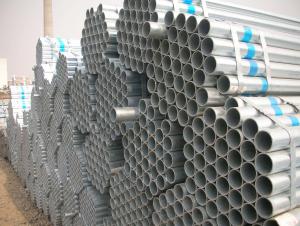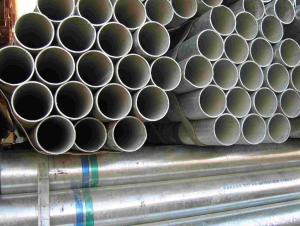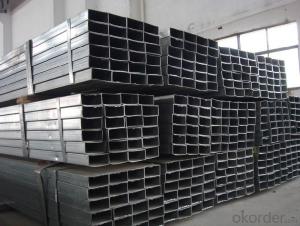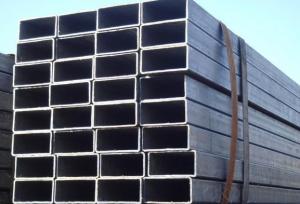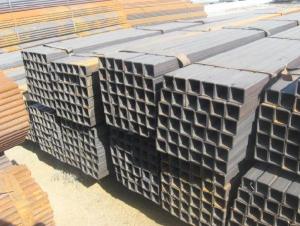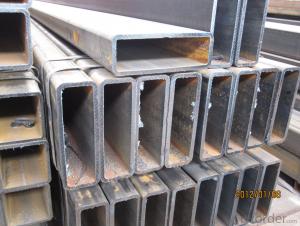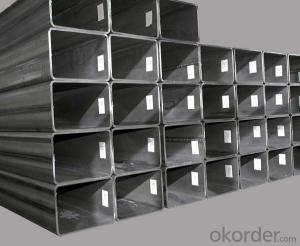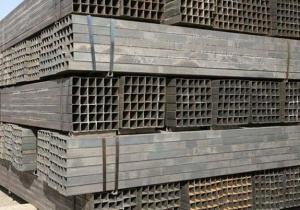BARED HOLLOW SECTION TUBE
- Loading Port:
- China Main Port
- Payment Terms:
- TT OR LC
- Min Order Qty:
- -
- Supply Capability:
- -
OKorder Service Pledge
OKorder Financial Service
You Might Also Like
Product Name | ||
Size | Size: | 10*10--500*500mm |
Thickness: | 0.45--16mm | |
Length: | 3-12m | |
Steel Grade | Q195,Q215,Q235,Q345,16Mn, 20# | |
Standard | ASTM A500,EN10219,GB/T6728,GB/T6725,JIS G3466 | |
Usage | 1. For Structure, Airport, Railway 2. Construction and so on. | |
Ends | Plain end or By Your Choice | |
Surface | Bared Or With Oiled Or Galvanized | |
Technique | ERW ,Hot Rolled and Cold Rolled | |
Section Shape | Rectangular | |
Inspection | With Hydraulic Testing, Eddy Current , Infrared Test | |
Package | Bags, Bundle, In Bulk, Containers | |
MOQ | 20 Metric Ton / Can Be Negotiated | |
Supply Ability | 15,000 Metric Ton/Month | |
Date of Delivery | 7 days(Qty within 1000 Metric Ton) or According To The Quantity | |
Port of Shipment | Tianjin, China | |
Payment | L/C T/T | |
- Q: Are steel tubes and round steel in weight or length when purchased?
- A large amount of words is calculated by weight, less is usually calculated. According to the length between the length and quality of a material is usually a scaling. Steel belongs to the section, with the length of valuation, according to the classification of wall thickness and diameter; round steel belongs to building materials, mostly for the amount of weighing per ton of valuation, a small amount of more than according to the length multiplied by the conversion ratio of weight to that theory. But the latter is the valuation of tons of steel products between the uneven thickness, with uniform proportion will produce larger price difference, so the general price of different manufacturers are not the same, mostly depends on the quality, to a certain extent is to balance the diameter difference.
- Q: How are steel pipes used in the agricultural irrigation systems?
- Due to their strength and durability, steel pipes are widely used in agricultural irrigation systems. These pipes effectively transport water from a well or reservoir to the fields where crops are cultivated. One major advantage of using steel pipes in such systems is their ability to withstand high pressure and heavy loads, making them suitable for the transportation of large volumes of water over long distances without the risk of bursting or breaking. Additionally, steel pipes exhibit a high resistance to corrosion, which is crucial in agricultural settings where they may come into contact with fertilizers or other chemicals. Aside from their durability, steel pipes offer a smooth interior surface that minimizes friction and ensures a consistent water flow. This is essential in irrigation systems as it guarantees even water distribution across the fields, promoting optimal crop growth. Moreover, steel pipes can be easily connected and configured to meet the specific layout and requirements of the irrigation system. In summary, steel pipes play a crucial role in agricultural irrigation systems by facilitating the efficient and reliable transportation of water to crops. Their strength, durability, resistance to corrosion, and smooth interior surface make them an ideal choice for these applications.
- Q: Can galvanized steel tubes simmer?
- Galvanized steel pipe can simmer bending.Is a set of bending bending bending die, no matter what kind of equipment, most are used in pipe, mainly used for oil and gas, infusion, more plays an important role in aircraft and engine.
- Q: What are the different methods of pipe lining for steel pipes?
- Some of the different methods of pipe lining for steel pipes include slip lining, cured-in-place pipe lining (CIPP), pipe bursting, and sliplining. Slip lining involves inserting a smaller diameter pipe into the existing steel pipe, while CIPP involves inserting a resin-impregnated liner into the pipe and curing it in place. Pipe bursting involves breaking the existing steel pipe and replacing it with a new pipe, while sliplining involves inserting a new pipe into the existing steel pipe without breaking it.
- Q: A333gr6 steel pipe and domestic material of the same?
- A333Gr.6 steel is no nickel steel is a kind of fine grain aluminum low temperature toughness of steel, therefore, also called Al killed steel. A333Gr.6 belongs to the United States ANSI and ASTM-SA333 cryogenic steel standards and is used at the lowest impact temperature of -46 degrees celsius. Its temperature, range of use and fracture toughness value are similar to those of domestic 16Mn steel (the minimum usage temperature of 16Mn steel is -40 degrees Celsius).
- Q: Can steel pipes be used for both high-pressure and low-pressure systems?
- Yes, steel pipes can be used for both high-pressure and low-pressure systems. Steel is known for its durability, strength, and resistance to extreme conditions, making it suitable for various applications. Whether it is transporting liquids or gases in high-pressure systems or low-pressure systems, steel pipes can efficiently handle the demands of both.
- Q: What is the impact of temperature on steel pipes?
- The impact of temperature on steel pipes is significant and can have both positive and negative effects. At high temperatures, steel pipes can experience thermal expansion, causing them to expand and potentially leading to distortion or buckling. This expansion can also affect the joints and connections, potentially causing leaks or failures. Therefore, it is crucial to consider the coefficient of thermal expansion when designing and installing steel pipes in high-temperature environments. On the other hand, steel pipes typically have excellent thermal conductivity, allowing them to withstand high temperatures without significant degradation. This makes them suitable for applications where heat transfer is a primary concern, such as in industrial processes or heating systems. Extreme cold temperatures can have detrimental effects on steel pipes as well. In freezing conditions, water or other fluids inside the pipes can expand and lead to cracks or bursts. This can cause leaks, loss of fluid, and potential damage to surrounding structures. Therefore, appropriate insulation and preventive measures need to be taken to ensure the integrity of steel pipes in cold environments. Additionally, temperature variations can also affect the mechanical properties of steel, such as its tensile strength and toughness. For instance, exposure to elevated temperatures over an extended period can lead to a phenomenon known as thermal degradation, where the steel's strength decreases, making it more prone to deformation or failure. In conclusion, the impact of temperature on steel pipes is significant and can influence their structural integrity, thermal performance, and mechanical properties. Proper design, insulation, and maintenance are essential to ensure the safe and efficient operation of steel pipes in various temperature conditions.
- Q: How can galvanized steel pipe be connected with stainless steel pipe?
- Welding methods are used to connect. Because galvanized pipe is in fact carbon steel pipe, so galvanized pipe and stainless steel pipe welding, in fact, carbon steel and stainless steel welding, welding of dissimilar materials.
- Q: How are steel pipes cleaned and flushed?
- Steel pipes can be cleaned and flushed using various methods depending on the specific requirements and conditions. One common method is mechanical cleaning, which involves the use of wire brushes, scrapers, or other abrasive tools to physically remove any debris, rust, or scale from the inner surface of the pipes. This method is effective for removing loose or easily detachable contaminants. Chemical cleaning is another widely used method, especially for pipes with more stubborn deposits or rust. Various chemicals or cleaning agents are flushed through the pipes to dissolve or loosen the buildup, which can then be washed away. Acid-based solutions are commonly used for this purpose, but it is important to choose the appropriate chemical and concentration to avoid damaging the pipes. High-pressure water jetting is another effective method for cleaning and flushing steel pipes. Water is pumped at high pressure through a nozzle, creating a powerful jet that can dislodge and remove any debris or deposits from the pipe walls. This method is particularly useful for removing hard or compacted materials that cannot be easily removed by other means. In some cases, a combination of these methods may be required to achieve the desired cleanliness. For instance, a pre-cleaning with mechanical tools can be followed by chemical cleaning or high-pressure water jetting to ensure thorough flushing and removal of contaminants. Regular maintenance and cleaning of steel pipes are essential to maintain their efficiency and prevent corrosion. It is important to follow proper procedures and safety guidelines when cleaning and flushing steel pipes to ensure effective results and avoid any damage to the pipes.
- Q: What's the difference between hot dip galvanizing and cold galvanizing? Which kind of galvanizing method is good?
- Cold galvanizing is zinc plating, the general surface is relatively smooth, no zinc flowers, there are two kinds of resistance to fingerprints and non - Fingerprint
Send your message to us
BARED HOLLOW SECTION TUBE
- Loading Port:
- China Main Port
- Payment Terms:
- TT OR LC
- Min Order Qty:
- -
- Supply Capability:
- -
OKorder Service Pledge
OKorder Financial Service
Similar products
Hot products
Hot Searches
Related keywords
